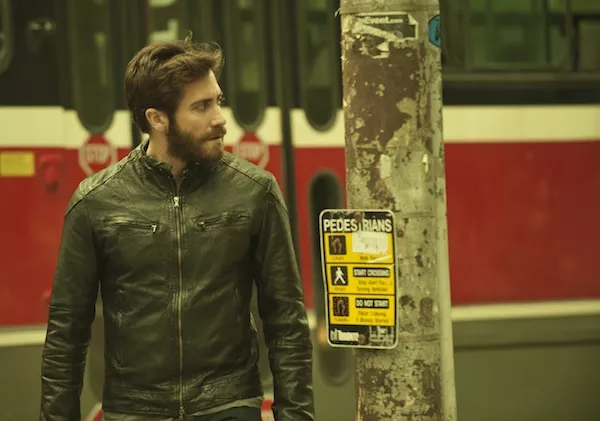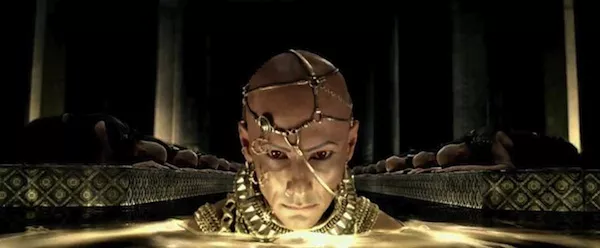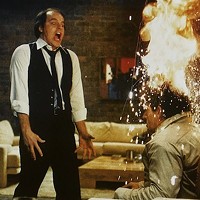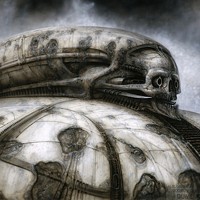(View From The Couch is a weekly column that reviews what's new on Blu-ray and DVD.)

-
Jake Gyllenhaal in Enemy (Photo: A24 and Lionsgate)
ENEMY (2014). The year's premier WTF achievement, Enemy is the type of film that will leave most viewers initially dumbfounded as it comes to a baffling close but will begin to work itself out as one repeatedly replays it in the movie theater of the mind. Ambiguous to a fault, it's at least unique and challenging, and in a movie year largely dominated by imbecilic efforts like Need for Speed and Pompeii — films that go out of their way to kill precious brain cells — that certainly counts for something. Director Denis Villeneuve and star Jake Gyllenhaal, whose Prisoners was one of last year's best films, are paired again for another thriller, this one based on Portuguese Nobel Prize winner Jose Saramago's novel O Homem Duplicado (The Double). Gyllenhaal plays Adam Bell, a mopey history professor who spends his evenings sleepily grading papers and mechanically having sex with his girlfriend (Melanie Laurent). Despite the fact that he dislikes movies, he rents one on the suggestion of a colleague and is stunned when he notes that a bit player looks exactly like him. Learning that the actor's name is Anthony St. Claire (also Gyllenhaal), a more extroverted type with a pregnant wife (Sarah Gadon) at home, Adam becomes obsessed with meeting his doppelganger. Scripter Javier Gullon opted to lop off the ending of Saramago's source material, instead sprinting in a different direction — not least by employing heavy use of unsettling spider imagery. Villeneuve then adds another coat of eeriness to the story, filming in a manner that suggests fellow Canadian filmmaker David Cronenberg (indeed, David's daughter Caitlin Cronenberg is credited as still photographer on this film). The central mystery, of course, is whether Adam and Anthony are complete strangers, somehow related, or actually the same person. There are clues pointing to the (possible) answer, but don't expect to find them all during the initial sitting. Instead, like a spider using its silk to ensnare its prey, they'll spin around in the brain before clamping down with clarity and purpose.
The only Blu-ray extra is a making-of featurette.
Movie: **1/2

-
Ralph Fiennes and Tony Revolori in The Grand Budapest Hotel (Photo: Fox)
THE GRAND BUDAPEST HOTEL (2014). The best film of writer-director Wes Anderson's career has happily also turned out to be his most profitable at the box office. Working with co-writer Hugo Guinness, Anderson has concocted a fanciful tale marinated in whimsy and tinged with ruefulness. After a pair of framing devices, the film takes us to the 1960s, where a young author (Jude Law) spends most of his time in a crumbling, practically empty hotel located in the fictional Republic of Zubrowka. There, he meets owner Zero Moustafa (F. Murray Abraham), who proceeds to tell him a story that takes us even further back in time. The setting is now the hotel during the early 1930s, when a boyish Zero (Tony Revolori) is serving as a lobby boy under the tutelage of M. Gustave (Ralph Fiennes), the property's ab-fab concierge. Gustave is superb at his job, which on the downside includes bedding the elderly — and wealthy — women who stay at the facility. One such individual is Madame D. (played by an unrecognizable Tilda Swinton in layers of wrinkled makeup), and when she passes away under mysterious circumstances, she wills an invaluable painting to Gustave. This displeases her son Dimitri (Adrien Brody) to such a degree that he frames Gustave as his mother's murderer and sics the family henchman, the snarling Jopling (a frightening/comical Willem Dafoe, replete with pointy teeth), to bump off anyone who interferes with his diabolical plot. Thus, it's largely up to Zero, with the aid of his girlfriend Agatha (Saoirse Ronan), to save his master and the day. Several of Anderson's past films, works like The Life Aquatic with Steve Zissou and Fantastic Mr. Fox, have showcased unique visual compositions, and with its generous use of models and matte backdrops, The Grand Budapest Hotel follows suit. The playful art direction is matched by the jocularity of the screenplay, which mines ample humor from the relationship between Gustave and Zero. Fiennes and Revolori prove to be a choice tag team, but they also shine individually, with Revolori making the most of his character's whispery demeanor and Fiennes sensational as the concierge whose occasional buffoonishness can't mask the tortured soul of a poet.
Blu-ray extras include a making-of featurette; a look at the location shooting, with co-star Bill Murray serving as tour guide; a still gallery; and the theatrical trailer.
Movie: ***1/2

-
Rodrigo Santoro in 300: Rise of an Empire (Photo: Warner Bros.)
300: RISE OF AN EMPIRE (2014). While The Grand Budapest Hotel is thus far the best film released in 2014, this belated sequel to the 2006 blockbuster 300 is the worst. Wholly unnecessary from a narrative angle — after all, the hunky heroes from the first film all died — this elects to follow a group of Greek warriors whose adventures are largely running concurrent to those of the 300. General Themistokles (Sullivan Stapleton) is in charge, though he knows his motley crew is no match for the massive Persian forces that are being led by Artemisia (Eva Green), a warrior woman whose viciousness knows no bounds. I wasn't the biggest fan of 300, but that film at least sported a then-distinctive look as well as offered Gerald Butler one of his few decent roles. This follow-up attempts to emulate its predecessor's visual palate but only winds up as an eyesore. The gore is neither realistic nor entertainingly over-the-top; instead, it appears storyboarded to death, with much of the bloodletting presented in studied slow motion. It's a dull, deadening approach, the type that can probably only be truly appreciated by 15-year-old boys and serial killers. As Artemisia, the ferocious Green is the only positive ingredient in this entire film, and yet I was troubled by the particulars of her role. In flashbacks, we see her as a young girl, watching the Greeks murder her father and rape and kill her mother. Then she's tossed into a prison, where grotesque men repeatedly rape her throughout her childhood, before she's thrown out onto the street to die. Watching these scenes, my only thought was, shouldn't she be the heroine of this film? Bruce Wayne suffered far less and became the noble Batman; ditto countless other male heroes. Here, this poor woman suffers horribly and yet is cast as the villain. I'm not really surprised by this development — the studio clearly knows its misogynistic fanbase, understanding that they won't think twice about the travails of a member of the supposedly inferior sex, especially when there are so many macho men to admire. But for a film already straining under the weight of cardboard characters, arid dialogue, erratic pacing and other deficiencies, adding this odious subtext only serves to make the finished product that much more of a travesty.
Blu-ray extras include making-of featurettes; a look at the film's warrior women; and a piece on the actors' physical preparations.
Movie: *

-
Tim Jenison in Tim's Vermeer (Photo: Sony)
TIM'S VERMEER (2014). The word "bloated" is often used to describe movies that run a punishing three hours when a mere two would have sufficed. Hence, it may seem odd to use it to describe a film that clocks in at 80 minutes — even less than the usual theatrical minimum of 90. Yet that's the case with Tim's Vermeer, a feature-length documentary that would have worked so much better as a documentary short. The Tim of the title is Tim Jenison, a man whose various inventions have made him filthy rich. With money to burn and time to kill, he decides to attempt to answer a question that's been tickling the minds of many art scholars: How did Johannes Vermeer, the 17th century Dutch painter best known for "Girl with a Pearl Earring," manage to make his portraits look eerily like photographs, long before photos were even invented? Jenison decides that Vermeer employed a camera obscura — Latin for "dark room," it's an optical device that allows for the projection of an image onto another surface — and sets about using similar techniques and circumstances to create an exact replica of the artist's "The Music Lesson." It's an arduous task that takes years to complete, and this movie, made by Jenison's buddies Penn Jillette and Teller (the magic duo), doesn't always know where the focus should rest. The nitty-gritty of the techniques are fascinating, as are some of Jenison's realizations along the way, but too much of the time is spent simply watching Jenison gather materials or centering on circular conversations in which various folks (including Jillette, artist David Hockney and art scholar Philip Steadman) repeatedly wonder aloud as to whether Vermeer created art or merely traced it. All involved insist that whatever the method, Vermeer is still a genius, but the takeaway from the movie is that of a modern-day man trying to one-up a historical figure. In tackling his project in such a technical and methodical manner, one can't help but lament that Jenison is missing the heart of the art — too often, he sees but he doesn't feel. In a bit of art-nerd humor, Jenison watches paint dry and cracks, "It's like watching paint dry." After sitting through the intermittently interesting but overlong Tim's Vermeer, I know how he feels.
Blu-ray extras include audio commentary by Jenison, Penn and Teller; deleted and alternate scenes; and a Q&A session.
Movie: **

-
Colin Farrell and Jessica Brown Findlay in Winter's Tale (Photo: Warner Bros.)
WINTER'S TALE (2014). Here's the thing about Winter's Tale, the film adaptation — make that condensation — of Mark Helprin's 671-page novel: You either fall into its fantasy world fully or you bolt from the couch in an effort to switch to another movie ASAP. Yet anyone who has enjoyed past films that subscribe to the "magical realism" concept — gems like The Purple Rose of Cairo, Amelie or Like Water for Chocolate — or even those who miss the grand romantic gestures often seen in movies from Hollywood's Golden Age should love at least half of the picture. That would be the first half, which introduces Colin Farrell as Peter Lake, a petty thief making the rounds in 1916 New York. Because Peter is a gentle soul, his vicious mentor, crime boss Pearly Soames (Russell Crowe), now wants him dead, but the execution is thwarted by the sudden arrival of a white horse with, shall we say, unusual traits. After saving Peter, the animal eventually leads him to a mansion in which resides Beverly Penn (Downton Abbey's Jessica Brown Findlay), a young woman who's dying of consumption. Between their irrefutable chemistry and obvious beauty, Farrell and Findlay prove to be one of the most enchanting screen couples in many a moon, and the magical mood cast by writer-director Akiva Goldsman suits their romance well. Unfortunately, the movie introduces a new character about midway through, and it never recovers from the miscasting of this crucial role. For it turns out that Pearly isn't just a ruthless mob boss but an actual demonic entity; he eventually takes a meeting with Lucifer, who's played by none other than ... Will Smith. What the devil? Ralph Fiennes, James Earl Jones, Christopher Lee — there's an endless supply of actors who would have been perfect for this role, but ... Will Smith? It's a casting blunder that takes us right out of the film — it's hard not to giggle throughout his two scenes — although, to be fair, other elements in the second half make it hard to remain fully immersed, including an increasingly disjointed story and the magical realism melting into mawkishness. That's a shame, because for one glorious hour, Winter's Tale convincingly pushes the notion that all we need is love.
Blu-ray extras include a making-of featurette; deleted scenes; and a look at the characters.
Movie: **1/2





